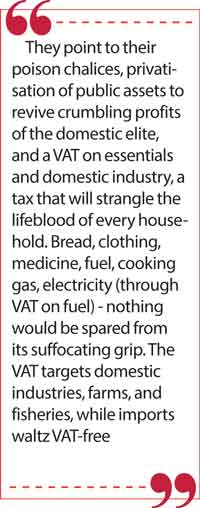Sunday Feb 15, 2026
Sunday Feb 15, 2026
Friday, 22 December 2023 00:30 - - {{hitsCtrl.values.hits}}

 The guillotine of taxes and privatisation hangs over Sri Lanka. Not in some distant future, but, on the doorstep of January. It is an economic carnage imposed by a corrupt, unmandated regime in the service of the rent-seeking elite and underdevelopment of the third world. It is drawing the last lifeblood of the people and auctioning off the nation’s soul piece by piece. All this, with the sole purpose of rewarding the owners of Government debt with interest, while killing the already reeling industries and pushing the mass of the people beyond poverty. Our elite stand on this crumbling ruins. To appease their insatiable power hunger and restore falling profits in a dying market, the Government is accelerating the privatisation of profitable state assets and legalising plunder through inflationary and regressive indirect taxation, particularly through Value Added Taxation (VAT). More of this horror awaits us under this regime shortly, with the blessings of the world powers from the East to the West, the IMF and the World Bank.
The guillotine of taxes and privatisation hangs over Sri Lanka. Not in some distant future, but, on the doorstep of January. It is an economic carnage imposed by a corrupt, unmandated regime in the service of the rent-seeking elite and underdevelopment of the third world. It is drawing the last lifeblood of the people and auctioning off the nation’s soul piece by piece. All this, with the sole purpose of rewarding the owners of Government debt with interest, while killing the already reeling industries and pushing the mass of the people beyond poverty. Our elite stand on this crumbling ruins. To appease their insatiable power hunger and restore falling profits in a dying market, the Government is accelerating the privatisation of profitable state assets and legalising plunder through inflationary and regressive indirect taxation, particularly through Value Added Taxation (VAT). More of this horror awaits us under this regime shortly, with the blessings of the world powers from the East to the West, the IMF and the World Bank.
They scream, "There's no alternative, and you must obey!" They paint a picture of inevitable doom in the absence of privatisation and crippling taxes, hoping to drown our outrage in the fear of the apparent ‘unknown’. But this should not deceive us for a second.
Aspects of VAT
They point to their poison chalices, privatisation of public assets to revive crumbling profits of the domestic elite, and a VAT on essentials and domestic industry, a tax that will strangle the lifeblood of every household. Bread, clothing, medicine, fuel, cooking gas, electricity (through VAT on fuel) - nothing would be spared from its suffocating grip. The VAT targets domestic industries, farms, and fisheries, while imports waltz VAT-free. For instance, locally produced milk products, coconut products, canned fish, eggs, sugar, rice-based products, locally produced fabric by non-BOI firms, software, tea-producing machines, machines producing renewable energy from wind, solar and hydropower, rubber and rubber products, products supplying the tourism sector and jewellery will be slapped with 18% VAT while imports of the same flow free. Therefore, even mildly expanding sectors capable of integrating labour with scientific advancement, invention, promoting industrialisation and prosperity are brought to a standstill, providing a competitive advantage to imports and foreign capital.
Reviving the imperial tax policy
It is a perfect replication of British colonial tax policy designed to crush the nascent industries of their imperial subjects. The British colonial administration imposed crushing taxes on Sri Lanka’s coconut oil production while imports of the same from Britain were almost tax-free and exports of raw copra from Sri Lanka supplying the British industries were tax-free (see S. B. D. De Silva, 1982, 2011, The Political Economy of Underdevelopment. London: Routledge). In India, the British decimated her textile industry by imposing choking taxes on the sector. At times they slit off the weavers’ thumbs to set India “free” from rural manufacture and ‘inundate the mother of cotton with British imports’ (see Karl Marx on India). This was the main  mechanism of exterminating competition on the imperial capitalist centre from the colonies and maintaining their underdevelopment, impoverishment and perpetual dependence on foreign debt and aid. And what is the fruit of this imperial/neo-colonial VAT policy now endorsed in high esteem by the IMF in its first review of Sri Lanka’s Extended Fund Facility?
mechanism of exterminating competition on the imperial capitalist centre from the colonies and maintaining their underdevelopment, impoverishment and perpetual dependence on foreign debt and aid. And what is the fruit of this imperial/neo-colonial VAT policy now endorsed in high esteem by the IMF in its first review of Sri Lanka’s Extended Fund Facility?
1. It will flood the market with cheaper imports, widen the market for local importers and foreign capital, and kill the struggling domestic industries. This in turn worsens the trade deficit, shrinking our thin gross foreign reserves, and sinking us further in foreign debt and dependence. It is reinstating the dominance of merchant and finance capital over productive industrial capital through state policy and hence cementing and perpetuating underdevelopment and economic neo-imperialism.
2. It will line the pockets of our debt-hoarding elite, both domestic and foreign, with 77% of Government revenue in 2024 gushing into their coffers through interest payments. We, meanwhile, tighten our belts till our bodies give in working round the clock while the elite fatten their wallets in sleep.
3. It will appease the insatiable IMF, that drain more and more from our shrinking economy like leeches on a dying beast, to reassure the creditors of debt repayments.
4. This will accelerate the brain drain by providing cheap scientific labour to capitalist centres, reviving its profit rate while depriving our productive capacity and essential public services like health and education.
Who stands to benefit from VAT and privatisation?
In this light, Sri Lanka achieved the dubious distinction of having the highest interest expenditure as a share of Government revenue globally this year. It pays 77% of the total revenue or Rs. 2,651 billion, mostly to domestic business elites (95%) holding our public debt hostage, and foreign holders of ISBs in interest payments. It is 11% greater than the total Government expenditure on salaries, wages and pensions, education, health, agriculture and Aswasuma social security spending combined!
The second in line is Ghana recording only 44%, despairingly below Sri Lanka. Even Argentina, a country vanishing in the quicksand of unrepayable debt has a ratio of only 8%! (World Bank data) Even after the Central Bank slashed 50% of incomes from the pension funds in domestic debt restructure (DDR), the domestic debt burden stands taller, as 75% of the highest-cost bonds issued last year are excluded from the DDR (CBSL Annual Report 2022 data), and are safely intact with the financial elites in the private sector, enjoying interest payments secured through murderous taxes and selling state assets, driving up prices for private enrichment.
The foreign debt plunder
 This is not only about the extra burden on our daily expenses. It is about paying for their plunder! The Auditor General's 2022 report on public debt screams the truth: 67% of the foreign debt the Government amassed between 2006 and 2021 is missing from Government assets! Where did it disappear? Into their offshore accounts, their luxury villas and automobiles guzzling fuel, destroying foreign exchange, the crucial savings of the nation, depreciating the currency and stoking hyperinflation? Even the IMF in its Governance Diagnostic says the embezzled debt is stashed away offshore and the current Government does nothing to neither reclaim it nor pursue litigation against perpetrators. Foreign debt plunder was a joint operation of the large corporations and the political establishment that thrived through public investments. Hand in hand, they gorged themselves while people starved. Over 55% of the population, 12.34 million people are facing ‘multidimensional vulnerability’ (UNDP). And now they demand to sell public assets and endure draconian taxes to pay for their crimes when evaded taxes surpass Rs. 900 billion, disregarding its present value (Inland Revenue Department).
This is not only about the extra burden on our daily expenses. It is about paying for their plunder! The Auditor General's 2022 report on public debt screams the truth: 67% of the foreign debt the Government amassed between 2006 and 2021 is missing from Government assets! Where did it disappear? Into their offshore accounts, their luxury villas and automobiles guzzling fuel, destroying foreign exchange, the crucial savings of the nation, depreciating the currency and stoking hyperinflation? Even the IMF in its Governance Diagnostic says the embezzled debt is stashed away offshore and the current Government does nothing to neither reclaim it nor pursue litigation against perpetrators. Foreign debt plunder was a joint operation of the large corporations and the political establishment that thrived through public investments. Hand in hand, they gorged themselves while people starved. Over 55% of the population, 12.34 million people are facing ‘multidimensional vulnerability’ (UNDP). And now they demand to sell public assets and endure draconian taxes to pay for their crimes when evaded taxes surpass Rs. 900 billion, disregarding its present value (Inland Revenue Department).
The time for reckoning has come. We will not be reduced to debt slaves of the neo-imperials and sleep while our futures bartered-off for their past crimes. Our factories stand idle, ranks of the unemployed grow each day, and our fields lie fallow, not for lack of potential, but for maintaining the class power of the establishment. Let’s reclaim them as we are the custodians of this land, not its auctioneers.
Let us flood the streets with indignation and resist with every fibre of our being, cleansing this land of the rent-seeking capitalist yoke. No neoliberal Goliath will stand against our stones of resistance, awareness, perseverance, denunciation of control, power, and reliance on the essence of compassion and goodwill. Ideologies of the dying order works in ways invisible. As we engage the beast, we must not fail to see its vestiges in us.
(The writer could be reached at: [email protected])
